Exploring Life Beyond Physical Death

Before diving in, please note: This post is for informational purposes only. If you’d like to know more about how we approach topics, feel free to check out our friendly Disclaimer Page.
Hey there, amazing readers! 🖐️ Just a quick note: yes, we know there are a lot of ads here. Trust us, we get it—it’s not the prettiest look, but they help us keep this blog alive and kicking. Those pesky little ads cover the costs of all the behind-the-scenes magic, from hosting and tech stuff to creating content we hope you’ll love.
We’re committed to delivering quality posts, and your support (even just sticking around despite the ads) means everything to us. So, bear with us, and thanks for helping us keep the good vibes rolling. Now, on to the fun stuff! 😉
TRANSLATE BUTTON AT THE END OF THE ARTICLE
A Quick Overview
Exploring the idea of life beyond physical death is a concept that has intrigued humanity for centuries.
The mystery of what happens after we pass away has led to a plethora of beliefs, theories, and experiences that attempt to shed light on this enigmatic subject.
From cultural traditions to scientific research, the exploration of life after death encompasses a wide range of perspectives and beliefs.
In this article, we will delve into various aspects of this intriguing topic, from near-death experiences to religious views on the afterlife, aiming to provide a comprehensive understanding of what may lie beyond the threshold of death.
The Mystery of Life After Death
The concept of life after death is one of the most profound mysteries that humanity grapples with.
While the physical body may cease to exist, many people believe that the essence of who we are continues on in some form or another.
Whether it is the soul, spirit, or consciousness, the idea of an existence beyond the earthly realm raises questions about the nature of our being and the ultimate fate of our consciousness after death.
This mystery has captivated philosophers, theologians, scientists, and everyday individuals, prompting a search for answers that transcend the boundaries of the material world.
Cultural Beliefs on the Afterlife
Various cultures around the world have developed intricate beliefs and practices surrounding the afterlife.
These beliefs often reflect the values, traditions, and spiritual understandings of a particular society.
For example, in ancient Egyptian culture, the idea of the afterlife was intricately tied to the process of mummification and the journey of the soul through the underworld.
In Hinduism, the concept of reincarnation plays a central role in understanding the cycle of birth, death, and rebirth.
These cultural beliefs provide insight into the diverse ways in which humanity has grappled with the mystery of what lies beyond physical death.
Near-Death Experiences: Insights
Near-death experiences (NDEs) offer a unique perspective on the possibility of life after death.
Individuals who have undergone NDEs often report a range of phenomena, including feelings of peace, seeing a bright light, encountering deceased loved ones, and experiencing a sense of being outside their physical bodies.
While skeptics may attribute these experiences to physiological or psychological factors, many people view NDEs as evidence of an existence beyond the physical realm.
The insights gained from NDEs provide a glimpse into the potential continuation of consciousness after the body ceases to function.
Scientific Studies on the Afterlife
Despite the intangible nature of the afterlife, some scientific studies have attempted to explore the possibility of life beyond death.
Researchers have investigated phenomena such as reincarnation, mediumship, and consciousness survival to gain a better understanding of what happens after we die.
While the scientific community remains divided on the validity of these studies, the exploration of the afterlife from a scientific perspective offers a unique opportunity to bridge the gap between spiritual beliefs and empirical evidence.
By approaching the subject with an open mind and rigorous methodology, scientists continue to push the boundaries of our understanding of the mysteries of existence.
Common Themes in Afterlife Accounts
Across various cultural and religious traditions, there are common themes that emerge in accounts of the afterlife.
These include the presence of a light or tunnel, encounters with deceased loved ones, feelings of peace and love, and a sense of being in a different dimension.
While the specifics of these accounts may vary, the underlying themes point to a universal human experience of transitioning from the physical world to a realm beyond our comprehension.
These commonalities suggest that there may be some fundamental truths about the afterlife that transcend cultural and religious boundaries, offering a glimmer of insight into what may await us after death.
Spiritual Perspectives on Death
Spiritual traditions offer profound insights into the nature of death and the afterlife.
From the concept of karma in Hinduism and Buddhism to the promise of eternal life in Christianity, spiritual perspectives on death provide solace, guidance, and hope to those grappling with the mysteries of existence.
These traditions often emphasize the interconnectedness of all living beings, the impermanence of life, and the transformative power of death as a gateway to spiritual growth.
By embracing spiritual teachings on death, individuals can find meaning, purpose, and comfort in the face of mortality.
Reincarnation: A Continuation of Life?
The belief in reincarnation is a prevalent concept in many spiritual and religious traditions.
The idea that the soul undergoes a series of births and deaths, each lifetime influenced by past actions and karma, offers a unique perspective on the continuation of life beyond physical death.
In traditions such as Hinduism, Buddhism, and Jainism, reincarnation is viewed as a way for the soul to evolve and progress towards spiritual enlightenment.
The concept of reincarnation raises questions about the nature of the soul, the purpose of life, and the interconnectedness of all beings in the cycle of birth and rebirth.
The Role of Religion in Understanding Death
Religion plays a pivotal role in shaping beliefs, rituals, and practices surrounding death and the afterlife.
From the Christian concept of heaven and hell to the Islamic belief in an afterlife of paradise or punishment, religious traditions offer a framework for understanding the mysteries of existence beyond physical death.
These teachings provide comfort, guidance, and moral direction to believers as they navigate the complexities of mortality and the afterlife.
By engaging with the teachings of their faith, individuals can find solace in the promise of a divine presence in the face of death.
The Impact of Near-Death Experiences
For individuals who have undergone near-death experiences, the impact of these profound encounters can be life-changing.
Many people report a shift in their priorities, beliefs, and outlook on life after experiencing an NDE.
These experiences often lead to a greater appreciation for life, a deepened spiritual awareness, and a sense of peace and interconnectedness with the universe.
While skeptics may question the validity of NDEs, those who have experienced them firsthand often find comfort and reassurance in the knowledge that there may be something beyond the physical realm waiting for them after death.
Exploring Different Afterlife Realms
The idea of different afterlife realms is a common theme in many religious and spiritual traditions.
From the celestial realms of heaven to the underworld of hell, these concepts offer a glimpse into the diverse possibilities of existence beyond physical death.
In some traditions, there are multiple afterlife realms that correspond to different levels of spiritual evolution, moral development, or karmic balance.
Exploring these afterlife realms can provide insight into the complex tapestry of existence and the potential paths that souls may traverse in their journey beyond the earthly realm.
Skepticism and Debunking Afterlife Claims
While many people hold strong beliefs in the existence of life after death, skepticism and debunking of afterlife claims are also prevalent in contemporary discourse.
Skeptics often point to scientific explanations, psychological factors, and cultural influences as the basis for purported afterlife experiences.
Debunking afterlife claims aims to promote critical thinking, rational inquiry, and evidence-based analysis of phenomena that may seem supernatural or otherworldly.
By approaching claims of the afterlife with a healthy dose of skepticism, individuals can discern fact from fiction and navigate the complexities of belief in an afterlife with a clear and rational mindset.
Coping with Grief and the Fear of Death
For many individuals, the prospect of death can evoke deep-seated fears, anxieties, and grief.
Coping with the fear of death involves acknowledging one’s mortality, embracing life fully, and finding meaning and purpose in the face of impermanence.
Grieving the loss of loved ones requires processing emotions, seeking support, and finding ways to honor the memories of those who have passed on.
By confronting the fear of death and navigating the grieving process with compassion and self-care, individuals can find peace, acceptance, and healing in the wake of loss and uncertainty.
Conclusion
Exploring life beyond physical death encompasses a wide range of beliefs, experiences, and perspectives that shed light on the mysteries of existence.
From near-death experiences to cultural traditions, scientific studies to spiritual teachings, the exploration of the afterlife offers a profound opportunity to contemplate the nature of consciousness, the fate of the soul, and the interconnectedness of all beings.
By delving into the various facets of life after death, we can gain a deeper understanding of the human experience and find solace, meaning, and hope in the face of mortality.
Remember, the mysteries of the afterlife may never be fully unraveled, but the journey of exploration and contemplation can offer profound insights into the nature of existence and the eternal questions that lie beyond the threshold of death.
As we navigate the complexities of mortality, let us embrace the diversity of beliefs, experiences, and perspectives that enrich our understanding of what may await us in the vast unknown beyond physical death.

The Enlightenment Journey is a remarkable collection of writings authored by a distinguished group of experts in the fields of spirituality, new age, and esoteric knowledge.
This anthology features a diverse assembly of well-experienced authors who bring their profound insights and credible perspectives to the forefront.
Each contributor possesses a wealth of knowledge and wisdom, making them authorities in their respective domains.
Together, they offer readers a transformative journey into the realms of spiritual growth, self-discovery, and esoteric enlightenment.
The Enlightenment Journey is a testament to the collective expertise of these luminaries, providing readers with a rich tapestry of ideas and information to illuminate their spiritual path.
Our Diverse Expertise 🌟
While our primary focus is on spirituality and esotericism, we are equally passionate about exploring a wide range of other topics and niches 🌍📚. Our experienced team is dedicated to delivering high-quality, informative content across various subjects ✨.
To ensure we provide the most accurate and valuable insights, we collaborate with trusted experts in their respective domains 🧑🏫👩🏫. This allows us to offer well-rounded perspectives and knowledge to our readers.
Our blog originally focused on spirituality and metaphysics, but we’ve since expanded to cover a wide range of niches. Don’t worry—we continue to publish a lot of articles on spirituality! Frequently visit our blog to explore our diverse content and stay tuned for more insightful reads.






